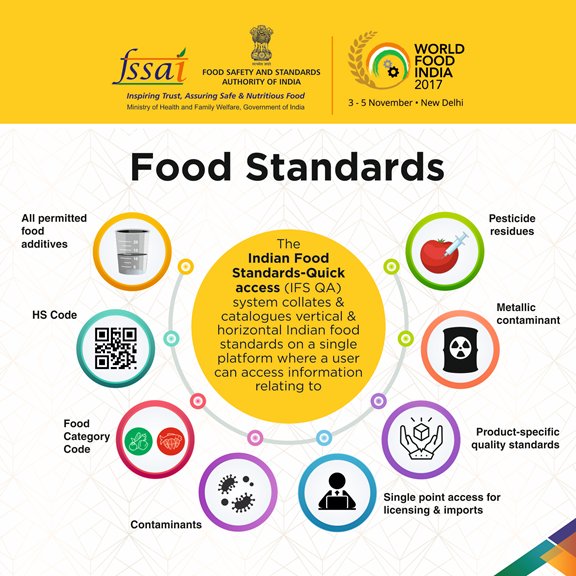


The Food Safety and Standards Authority of India (FSSAI) has rejected food consignments from various countries, citing concerns over food safety and quality. This decision highlights India's growing vigilance in regulating food imports and safeguarding public health. Stakeholders are urged to ensure compliance with safety norms to avoid similar rejections in the future. With increasing scrutiny on imported goods, the rejection of these consignments reflects the FSSAI's commitment to enforcing strict regulations and protecting consumer interests in the face of global supply chain challenges.
FSSAI's Rejections of Food Consignments: Ensuring Food Safety in India
The Food Safety and Standards Authority of India (FSSAI) has taken a proactive stance in safeguarding public health by rejecting food consignments from several countries due to concerns over safety and quality. This decision underscores the growing importance of regulating food imports in India.
Background:
India has witnessed a significant increase in food imports in recent years, raising concerns about potential risks to consumer health. The FSSAI has been entrusted with the responsibility of ensuring the safety of food imported into the country. To this end, it has established stringent regulations and standards to prevent the entry of unsafe or substandard food products.
Reasons for Rejections:
The FSSAI has cited various reasons for rejecting food consignments, including:
Impact of Rejections:
The rejection of food consignments has several implications:
Top 5 FAQs:
1. What countries have had food consignments rejected by the FSSAI? Answer: Several countries, including China, Malaysia, Vietnam, and the United States, have had food consignments rejected by the FSSAI.
2. What types of food products have been rejected? Answer: The rejected food products have included various items such as fruits, vegetables, meat, seafood, and processed foods.
3. What are the specific safety concerns that led to the rejections? Answer: The concerns have ranged from the presence of pesticides and heavy metals to microbial contamination and inadequate labeling.
4. What is the FSSAI doing to prevent future rejections? Answer: The FSSAI is working to strengthen collaborations with foreign regulatory agencies, improve inspection systems, and enhance importer education.
5. What can consumers do to ensure food safety? Answer: Consumers can check for the FSSAI logo on food packaging, purchase food from reputable sources, practice proper food handling techniques, and report any suspected food safety issues.
Conclusion:
The FSSAI's rejection of food consignments is a testament to its commitment to protecting public health and ensuring the safety of imported food products. By adhering to strict regulations and enforcing international standards, the FSSAI is safeguarding India's food supply chain and mitigating risks to consumer well-being.

In a heated verbal exchange, Maratha quota activist Manoj Jarange Patil accused NCP Minister Chhagan Bhujbal of attempting to create a rift between the OBC and Maratha communities for political gain. During a recent OBC rally in Beed, Bhujbal and Dhananjay Munde attacked Jarange, with Pankaja Munde, a BJP OBC leader, watching from the sidelines. Jarange also praised Chief Minister Devendra Fadnavis and Minister Pankaja Munde for staying away from the rally and emphasized the unity of the OBC community. Bhujbal, on the other hand, warned Jarange against challenging the community's rights and vowed to stand up against any attempts to divide them.

On the auspicious occasion of Bhai Dooj, Madhya Pradesh Chief Minister Mohan Yadav transferred a total of 44,900 crore directly into the bank accounts of 1.27 crore women beneficiaries under the Ladli Bahna Yojana. This initiative aims to support and empower women in the state, with each eligible woman set to receive 1,500 per month from November onwards. During the special program at the Chief Minister's residence, Yadav extended his wishes for a happy Bhai Dooj, emphasizing the importance of the brother-sister relationship and the government's commitment towards ensuring the safety and well-being of Ladli Bahnas in the state.

Union Home Minister Amit Shah celebrated the Gujarati New Year and his 62nd birthday in his hometown of Ahmedabad, surrounded by senior political leaders, party members, and well-wishers. Shah's rise in public life through the RSS and his partnership with Prime Minister Narendra Modi have shaped Gujarat's and India's political narrative. His sharp organisational mind, efficient approach, and booth-level political management have been key in building the "Gujarat model" that gave the BJP an enduring edge. Despite transitioning to national politics, Shah's political heart still beats in Ahmedabad, as evident in his New Year celebrations and plans to meet the newly appointed ministers of the Gujarat cabinet.

In a recent incident at the Vasai Fort in Maharashtra, a man dressed as Chhatrapati Shivaji Maharaj got into a heated argument with a security guard over language. The man, who was recording a video, berated the guard for not speaking Marathi and disrespecting the legacy of Shivaji Maharaj. Social media users were divided in their opinions, with some criticizing the man's behavior while others felt the guard needed to be taught a lesson.

In a significant moment for gender equality, President Droupadi Murmu became the first woman to visit the Lord Ayyappa Temple in Sabarimala. Accompanied by her team, she performed Darshan and Puja at the shrine, praying for the well-being and prosperity of her fellow citizens. Her visit symbolized the Supreme Court's decision to lift the ban on menstruating women entering the temple, reminding us that devotion knows no gender barriers.

With early voting just days away, the three major candidates vying to become New York City's next mayor are gearing up for the final debate in what could be their last chance to sway voters. The debate, hosted by Spectrum NY1, The City, and WNYC/Gothamist, will cover issues such as affordability, crime, and the role of former President Donald Trump in the city's politics. With the stakes high and the clock ticking, Democrats Zohran Mamdani and Andrew Cuomo and Republican Curtis Sliwa will need to make a strong case for themselves to secure the future of New York City.

CM Yogi Adityanath's statement about the role of "political Islam" in undermining Sanatan Dharma has sparked controversy and discussion throughout the nation. During an event organized by the Rashtriya Swayamsevak Sangh (RSS), he highlighted the struggles of Indian warriors against political Islam, claiming that this aspect of history is often overlooked. Adityanath's remarks have renewed debates on the representation of India's historical narrative and the impact of colonialism and political Islam.

Samajwadi Party chief Akhilesh Yadav's remarks questioning the government's spending on Diwali celebrations in Ayodhya, and his comparison to Christmas festivities worldwide, have sparked controversy. While the BJP has accused Yadav of being envious of Ayodhya's success, the Vishva Hindu Parishad has criticized him for undermining Indian culture. The comments highlight the tension between political parties over religious and cultural events.

On the occasion of Home Minister Amit Shah's 60th birthday, Maharashtra CM Devendra Fadnavis wished him with a special message on Twitter, calling him the "Chanakya of Indian politics." Fadnavis praised Shah's political acumen and leadership, stating that his contribution to the nation remains unmatched. PM Narendra Modi also conveyed his greetings, commending Shah's dedication to public service and national security. Leaders across India, including former Tamil Nadu CM Edappadi K Palaniswami, extended their wishes and praised Shah's steadfast leadership and tireless dedication.

On Home Minister Amit Shah's birthday, Prime Minister Narendra Modi took to social media to convey his wishes and praise his efforts towards improving India's internal security. Modi highlighted Shah's dedication to public service and hardworking nature, which has earned him admiration from across the country.